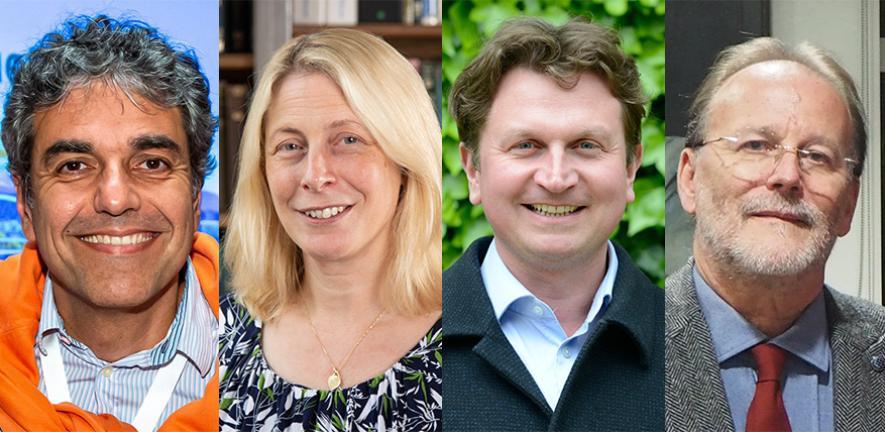The European Research Council (ERC) has announced today the award of 255 Advanced Grants to outstanding research leaders across Europe, as part of the EU’s Horizon Europe programme. Four University of Cambridge researchers are amongst those to receive this prestigious and competitive funding.
The University of Cambridge’s grant awardees are:
Professor Albert Guillén i Fàbregas in the Department of Engineering for his project Scaling and Concentration Laws in Information Theory.
Guillén i Fàbregas, who has previously received ERC Starting, Consolidator and Proof of Concept Grants, said: “I am truly delighted with the news that the ERC will continue to fund my research in information theory, which studies the mathematical aspects of data transmission and data compression.
“This project will broaden the theory to study arbitrary scaling laws of the number of messages to transmit or compress."
Professor Beverley Glover in the Department of Plant Sciences and Director of Cambridge University Botanic Garden, for her project Convergent evolution of floral patterning through alternative optimisation of mechanical parameter space.
Glover said: “This funding will enable us to explore how iridescent colour evolved repeatedly in different flowers. We think it will shed new light on evolution itself, as we think about the development of iridescence structure from a mechanical perspective, focusing on the forces acting as a petal grows and the mechanical properties of the petal tissue.
“It's only possible for me to do this work because of the amazing living collection at Cambridge University Botanic Garden, and I'm thrilled that the ERC is keen to support it."
Professor Ian Henderson in the Department of Plant Sciences for his project Evolution of the Arabidopsis Pancentromere.
Henderson said: “This project seeks to investigate enigmatic regions of the genome called the centromeres, using the model plant Arabidopsis. These regions play a deeply conserved role in cell division yet paradoxically are fast evolving.
“I am highly honoured and excited to be awarded an ERC Advanced grant. The advent of long-read sequencing technology makes addressing these questions timely. The ERC’s long-term support will allow us to capitalise on these advances, build new collaborations, and train postdoctoral researchers.”
Professor Paul Lane in the Department of Archaeology, for his project Landscape Historical Ecology and Archaeology of Ancient Pastoral Societies in Kenya.
Lane said: “Pastoralism has been an extraordinarily resilient livelihood strategy across Africa. This project provides an excellent opportunity to reconstruct how East Africa’s pastoralists responded to significant climate change in the past, and to draw lessons from these adaptations for responding to contemporary climate crises in a region that is witnessing heightened water scarcity and loss of access to critically important grazing lands.”
“This project will allow us to utilise the department’s world-leading archaeological science laboratories and expertise to answer crucial questions about past patterns of mobility, dietary diversity, climatic regimes and food security among East African pastoralists over the last fifteen hundred years. This has never been attempted before for this time period.” Read more about Professor Lane's project here.
Professor Anne Ferguson-Smith, Pro-Vice Chancellor for Research at the University of Cambridge said: “Many congratulations to Albert, Beverley, Ian and Paul on receiving these prestigious and highly competitive awards. It is fantastic that their ambitious, cutting-edge research will be supported by the European Research Council, marking them as outstanding European research leaders.
“Now that the UK is an associated country to Horizon Europe I encourage other Cambridge researchers to also consider applying to the ERC and other Horizon Europe programmes.”
President of the European Research Council Professor Maria Leptin said: “Congratulations to the 255 researchers who will receive grants to follow their scientific instinct in this new funding round. I am particularly happy to see more mid-career scientists amongst the Advanced Grant winners this time. I hope that it will encourage more researchers at this career stage to apply for these grants.”
The ERC is the premier European funding organisation for excellent frontier research. The 255 ERC Advanced Grants, totalling €652 million, support cutting-edge research in a wide range of fields from medicine and physics to social sciences and humanities.
The European Commission and the UK Government have reached an agreement on the association of the UK to Horizon Europe, which applies for calls for proposals implementing the 2024 budget and onwards.
The ERC Advanced Grants target established, leading researchers with a proven track-record of significant achievements. In recent years, there has been a steady rise in mid-career researchers (12-17 years post-PhD), who have been successful in the Advanced Grants competitions, with 18% securing grants in this latest round.
Reproduced courtesy of the University of Cambridge.
Image: courtesy of the University of Cambridge.



